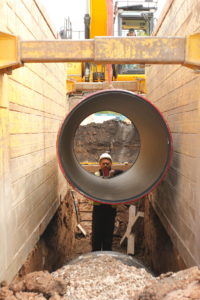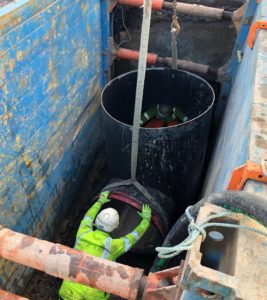
Aquaspira has delivered an innovative sustainable drainage strategy, designed to reduce 315 cubic metres of excavation and saving around 20 days of construction time, at a new housing project which is underway in Dalkeith.
The Northwest drainage specialist was appointed by Cruden Building which is delivering the 79 home development at Morris Road in Newtongrange. The scheme will provide a mix of two-storey energy-efficient homes and cottage flats, supporting Midlothian Council’s Local Housing Strategy which is designed to deliver a high priority and cost-efficient contribution to the local housing supply.
Mark Stanway from Aquaspira explained: “We were able to rethink the entire approach to construction of the drainage at this site. Seven concrete manholes were original specified each requiring a four metre wide excavation. By using a strong, compact steel reinforced push-fit solution we were able to reduce the number of vehicle movements to site by 60%, as well as cutting the amount of bedding and backfill by half.
“Our access units also reduced the installation of each manhole from an average of four days to around an hour, delivering dramatic cost and timing savings to the job, as well as providing a far more environmentally friendly and safer solution.”
 Land utilisation was maximised by using the ground beneath the estate roads for all of the stormwater storage, and a simplified, safer, and accelerated strategy used these UK-manufactured push-fit, large diameter pipes with access units as an alternative to concrete.
Land utilisation was maximised by using the ground beneath the estate roads for all of the stormwater storage, and a simplified, safer, and accelerated strategy used these UK-manufactured push-fit, large diameter pipes with access units as an alternative to concrete.
The pipes were installed by GBSS Civils and Plant Hire Ltd, talking about the ease of installation, Andy Paterson from GBSS said: “The 1,800mm and 1,200mm pipes were much easier to handle and install than similar size concrete pipes which, together with the rapid, very simple fitting of the prefabricated Access Units, made a massive difference to the job”
The solution was in-keeping with Midlothian Council’s drive to deliver modern high-quality homes which incorporate energy-efficient components within the homes as well as through eco-friendly construction solutions such as this.
Midlothian Council’s Cabinet Member for Housing Councillor Stephen Curran commented: “This project demonstrates how innovative construction techniques can contribute to making developments more sustainable and are in line with the council’s commitment to be carbon neutral by 2030 as outlined in our Climate Change Strategy.”

Aquaspira is on a mission to deliver low carbon construction solutions. The Lancashire-based company has been investing extensively in research and development which has seen the use of recycled materials in its products increased, as well as using solar power in the manufacturing process. The company is working with the University of Birmingham to develop a digital twin to improve design and to investigate the use of recycled materials for backfill to further reduce carbon usage in the construction sector and use sensors in pipes for long-term monitoring and maintenance. This research can make a huge step-change in helping the construction sector achieve government decarbonisation targets.
Aquaspira’s unique light weight composite pipe already reduces the number of vehicle movements and fuel consumption when compared to traditional concrete products. A significant advantage with the current shortage of haulage drivers. All of these innovations help utility companies, housebuilders and the wider infrastructure and construction sectors reduce their impact on the environment.








